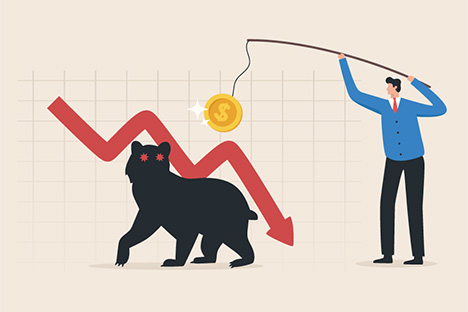Last week Bill O’Reilly interviewed me about a subject that irritates us both: woke capitalism.
Too many public companies are busy pursuing a social justice agenda that hurts the people it claims to help and reduces – rather than maximizes – shareholder profits.
Before we got into the subject, however, Bill – a longtime subscriber and friend of The Oxford Club – confessed that he hadn’t invested in anything over the last eight months.
“I’m curious,” he said, “what are you doing with your own money?”
And so I told him…
I’m buying high-quality stocks, just like I have in every market downturn over the last 40 years, including the crash of ’87, the Gulf War bear market in 1990, the dot-com bust, the post-9/11 meltdown, the financial crisis of 2008 and 2009, and the COVID collapse in 2020.
The reason is simple. The lower your cost basis on your investments, the higher your eventual return.
Most investors realize this. The problem is acting on it.
I know this because I was in the money management business for almost two decades before I joined The Oxford Club as Chief Investment Strategist 23 years ago.
It was all I could do to persuade my clients to remain invested during the downturns.
Getting them to buy beaten-down shares in a bear market was out of the question for most of them.
I’ve never quite understood why…
A look at history tells you that every economic expansion is followed by an economic contraction (or recession).
And that’s okay. Because every recession is followed by an economic expansion.
Likewise, every bull market is followed by a bear market.
And that’s okay, too. Because every bear market is followed by another bull market, just as day follows night and spring follows winter.
The big difference, of course, is that night is entirely predictable. And so is spring.
No one can tell you with any certainty when the next recession will begin or end. Or the next bull market.
The unpredictability of markets is what makes them scary.
Yet knowledge is an antidote.
Robert Shiller data shows that you could start on any date over the past 100 years and the probability that the market would be higher is 69% in one year, 83% in five years, 90% in 10 years and 100% in 20 years.
That should give you comfort – or courage – in a nasty bear market.
Let me confess, however, that I’m a skeptic. I doubt everything.
That includes the conventional wisdom that since a diversified portfolio of U.S. stocks has averaged 10% a year over the last couple hundred years, you can expect a long-term return of 10% going forward.
That is not necessarily so.
You could earn less. (This is especially true over shorter periods.)
You could also earn more.
Stock returns are not constant like the speed of light or the force of gravity.
They depend on the economy, interest rates, inflation, commodity prices, currency fluctuations, scientific advances, business developments, new laws and regulations, war and geopolitics, fear and greed, and plenty of other factors.
These vary greatly from year to year and even decade to decade.
And like equities themselves, these factors are largely unpredictable.
If you’re an investor who wants a guaranteed return, you need to own bonds.
(And if you want the highest-quality guarantee, U.S. Treasury bonds.)
A bond is a contract enforceable in a court of law.
Shares of stock represent a fractional ownership in a business. They promise their owners nothing.
And they require a high degree of faith in the future.
That is why investors demand a higher return on stocks than bonds.
But… a high degree of faith in the future? Who has that these days?
Look at the level of inflation. Look at Russia, China, Iran and North Korea – and the trouble they cause. Look at the $31.5 trillion national debt. Look at the more than 37 billion metric tons of carbon we put into the atmosphere each year. And, not least of all, look at who is running the country: a doddering octogenarian and his sidekick, the cackler.
How can anyone take a clearheaded look at the world and have enough faith in the future to risk their hard-earned savings in the stock market?
I’ll reveal the surprising answer in Monday’s column.
